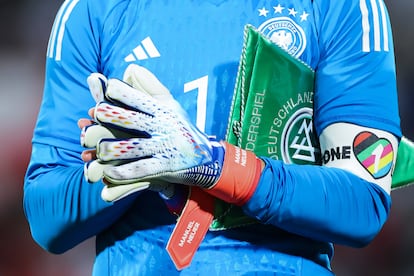FIFA threats remove OneLove armbands from captains at Qatar World Cup
England, the Netherlands and Wales were among those who had pledged to wear the symbol in support of the LGBTQ+ community but their federations backtracked over risk of yellow cards

FIFA has managed to prevent Harry Kane, Virgil van Dijk and Gareth Bale from wearing the rainbow bracelets of the OneLove campaign they had pledged to display “against all kinds of discrimination” in their opening World Cup matches in Qatar. Just three hours before England and Iran took to the pitch on Monday, the Football Federations (FA) of England, Wales, Belgium, Denmark, Germany, the Netherlands and Switzerland issued a joint statement announcing they were backtracking due to FIFA president Gianni Infantino’s opposition to publicly defending the rights of the LGBTQ+ community in the emirate, where homosexuality is considered a crime:
“FIFA has been very clear that it will impose sporting sanctions if our captains wear the armbands on the field of play,” the statement read. Infantino said on Saturday, a day before the tournament started, that FIFA has “clear regulations on armbands.” It was subsequently announced that if a captain wore the OneLove armband onto the pitch, he would receive an immediate yellow card.
The Dutch FA, which led the initiative, said in another statement FIFA had issued last-minute threats despite continuous negotiations over the past two days, after having waited two months for a response to the letter they sent the world governing body in September regarding the OneLove campaign: “You don’t want the captain to start the match with a yellow card. That is why it is with a heavy heart that we as a UEFA working group and as a team had to decide to abandon our plan,” the Dutch statement said.
The Football Supporters’ Association also expressed their anger: “Today we feel betrayed,” the organization said in a statement. “Never again should a World Cup be handed out solely on the basis of money and infrastructure. No country which falls short on LGBTQ+ rights, women’s rights, worker’s rights or any other universal human right should be given the honour of hosting the World Cup.”
#QatarWorldCup2022 #OneLove pic.twitter.com/2NNgZrL5IX
— The FSA (@WeAreTheFSA) November 21, 2022
FIFA’s threat of sporting sanctions finally led to the decision of the seven FAs supporting the initiative to instruct their captains not to wear the armband, as the English and Welsh federations stated in a joint text: “We were prepared to pay fines that would normally apply to breaches of kit regulations and had a strong commitment to wearing the armband. However, we cannot put our players in the situation where they might be booked or even forced to leave the field of play. We are very frustrated by the FIFA decision which we believe is unprecedented – we wrote to FIFA in September informing them of our wish to wear the One Love armband to actively support inclusion in football, and had no response.”
Despite an impassioned and widely derided speech in defense of the Qatar World Cup on Sunday, during which Infantino said: “Today, I feel Qatari. Today, I feel Arab. Today, I feel African. Today, I feel gay. Today, I feel disabled. Today, I feel like a migrant worker,” and the words of his openly gay director of communications Bryan Swanson, the FIFA president said a day later that the world governing body could only champion causes that could be shared by all during the tournament.
Ten federations joined the OneLove initiative although two of them, Norway and Sweden, did not qualify for the World Cup. The Netherlands, Belgium, Denmark, Germany, England, Wales, Switzerland and France had all pledged to support the campaign although the captain of the current world champions, Hugo Lloris, had already announced that he would not wear the rainbow armband in Qatar, stating that he felt he should respect the customs of the tournament’s host country just as France asks foreigners to respect their own.
Sign up for our weekly newsletter to get more English-language news coverage from EL PAÍS USA Edition
Tu suscripción se está usando en otro dispositivo
¿Quieres añadir otro usuario a tu suscripción?
Si continúas leyendo en este dispositivo, no se podrá leer en el otro.
FlechaTu suscripción se está usando en otro dispositivo y solo puedes acceder a EL PAÍS desde un dispositivo a la vez.
Si quieres compartir tu cuenta, cambia tu suscripción a la modalidad Premium, así podrás añadir otro usuario. Cada uno accederá con su propia cuenta de email, lo que os permitirá personalizar vuestra experiencia en EL PAÍS.
¿Tienes una suscripción de empresa? Accede aquí para contratar más cuentas.
En el caso de no saber quién está usando tu cuenta, te recomendamos cambiar tu contraseña aquí.
Si decides continuar compartiendo tu cuenta, este mensaje se mostrará en tu dispositivo y en el de la otra persona que está usando tu cuenta de forma indefinida, afectando a tu experiencia de lectura. Puedes consultar aquí los términos y condiciones de la suscripción digital.









































